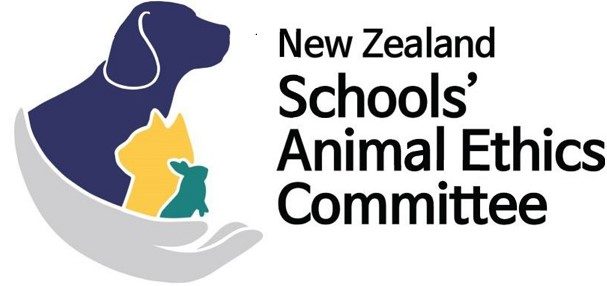This page will give you information on how to complete your Animal Ethics application.
For most school projects involving animals, the Animal Welfare Act stipulates that animal ethics approval must be obtained before the commencement of the project.
Requirements:
- When thinking about your project, consider why you are wanting to use an animal. The use of an animal should be to enhance educational outcomes, with the prevention of harm. Every student and staff member should be mindful of the Three Rs (Replacement, Reduction, and Refinement) when working with animals in a teaching environment. If you plan to use large numbers of animals, you should consider whether a smaller number would be enough. The welfare of the animal/s in your project is your responsibility.
- Please ensure that you complete all sections of the form. If an application is received incomplete, the Animal Ethics Committee will not be able to consider the application during the meeting, leading to a delay in you being able to obtain approval and starting your project.
- You must make contact with someone who has experience or is qualified in identifying any risks with your project. All actual and potential risks to the animal and/or to yourself should be considered.
- Your application should be submitted to: animalethicscommitteenz@gmail.com at least 7 days prior to the next meeting date.
Exemplars:
Inspiration
Here are a few ideas for projects:
- Paw preferences in cats & dogs using normal toys & normal treats – Are they ambidextrous?
- Frog whistling in the wild under different weather conditions
- Seeing how cats respond to smell or hearing cues associated with dinner
- Turtle’s response to being called by name
- Numbers of poos cows do
- Do chickens register colour?
- Hoof oil on hoof growth in horses
- Making of a solar powered dog kennel to warm the kennel at night
- Dominance in mothering chickens at feeding time
- Reactions of cats to different bird sounds
- See if cats have unique paw prints
- Pet preferences for fruit, meat & vegies; cat wet meat or dry biscuits
- Mice/rat/guinea pig maze – can they learn a trail?
- Chicken preferences for vegies, wheat & pellets
- Bird feeder colour preference in wild birds
- Trying find out the best/favourite dog biscuit
- Food preference in cats
- Can you to train a dog/s to recognise three different coloured cards that are associated with different tricks/commands?
Human Ethics
If your project will involve humans in anyway, you must plan how you will incorporate the Human Ethics guidelines.
Please follow this link to downloads the Human Ethics Planning Template from the Royal Society NZ.
Frequently asked questions
| Q | Do we need to apply for animal ethics review to visit a rocky shore? We will not be taking any specimens but will be turning over rocks and potentially picking up crab and fish. |
| A | Approval is not required since you are not interfering with the integrity of the animal. In fact, your activities are more akin to hunting of any animal in a wild state by a method that is not an experimental method which is specifically excluded as a manipulation according to the Animal Welfare Act. |
| Q | Can you please advise whether a child needs animal ethics approval for a project for the Science Fair that involves shellfish? |
| A | Yes, whilst shellfish do not need approval. Science fair require that all animal projects need to go before an ethics committee as a prerequisite for entry. In these cases, if students complete an application form, we ‘sanction’ them and provide the students with “approval not required” certification. |
| Q | I would like to do a science experiment involving butterfly eggs. Do I need Ethics Approval? |
| A | No, the Animal Ethics Committee can advise that as this project involves invertebrates, it does not require Animal Ethics approval. |
